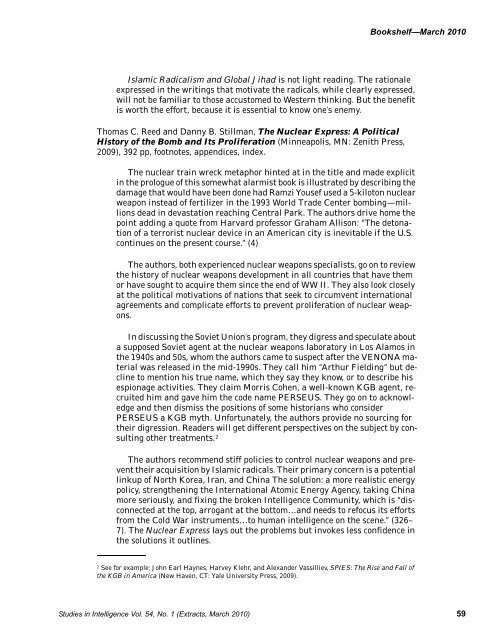Studies in Intelligence - The Black Vault
Studies in Intelligence - The Black Vault
Studies in Intelligence - The Black Vault
Create successful ePaper yourself
Turn your PDF publications into a flip-book with our unique Google optimized e-Paper software.
Bookshelf—March 2010<br />
Islamic Radicalism and Global Jihad is not light read<strong>in</strong>g. <strong>The</strong> rationale<br />
expressed <strong>in</strong> the writ<strong>in</strong>gs that motivate the radicals, while clearly expressed,<br />
will not be familiar to those accustomed to Western th<strong>in</strong>k<strong>in</strong>g. But the benefit<br />
is worth the effort, because it is essential to know one’s enemy.<br />
Thomas C. Reed and Danny B. Stillman, <strong>The</strong> Nuclear Express: A Political<br />
History of the Bomb and Its Proliferation (M<strong>in</strong>neapolis, MN: Zenith Press,<br />
2009), 392 pp, footnotes, appendices, <strong>in</strong>dex.<br />
<strong>The</strong> nuclear tra<strong>in</strong> wreck metaphor h<strong>in</strong>ted at <strong>in</strong> the title and made explicit<br />
<strong>in</strong> the prologue of this somewhat alarmist book is illustrated by describ<strong>in</strong>g the<br />
damage that would have been done had Ramzi Yousef used a 5-kiloton nuclear<br />
weapon <strong>in</strong>stead of fertilizer <strong>in</strong> the 1993 World Trade Center bomb<strong>in</strong>g—millions<br />
dead <strong>in</strong> devastation reach<strong>in</strong>g Central Park. <strong>The</strong> authors drive home the<br />
po<strong>in</strong>t add<strong>in</strong>g a quote from Harvard professor Graham Allison: “<strong>The</strong> detonation<br />
of a terrorist nuclear device <strong>in</strong> an American city is <strong>in</strong>evitable if the U.S.<br />
cont<strong>in</strong>ues on the present course.” (4)<br />
<strong>The</strong> authors, both experienced nuclear weapons specialists, go on to review<br />
the history of nuclear weapons development <strong>in</strong> all countries that have them<br />
or have sought to acquire them s<strong>in</strong>ce the end of WW II. <strong>The</strong>y also look closely<br />
at the political motivations of nations that seek to circumvent <strong>in</strong>ternational<br />
agreements and complicate efforts to prevent proliferation of nuclear weapons.<br />
In discuss<strong>in</strong>g the Soviet Union’s program, they digress and speculate about<br />
a supposed Soviet agent at the nuclear weapons laboratory <strong>in</strong> Los Alamos <strong>in</strong><br />
the 1940s and 50s, whom the authors came to suspect after the VENONA material<br />
was released <strong>in</strong> the mid-1990s. <strong>The</strong>y call him “Arthur Field<strong>in</strong>g” but decl<strong>in</strong>e<br />
to mention his true name, which they say they know, or to describe his<br />
espionage activities. <strong>The</strong>y claim Morris Cohen, a well-known KGB agent, recruited<br />
him and gave him the code name PERSEUS. <strong>The</strong>y go on to acknowledge<br />
and then dismiss the positions of some historians who consider<br />
PERSEUS a KGB myth. Unfortunately, the authors provide no sourc<strong>in</strong>g for<br />
their digression. Readers will get different perspectives on the subject by consult<strong>in</strong>g<br />
other treatments. 2<br />
<strong>The</strong> authors recommend stiff policies to control nuclear weapons and prevent<br />
their acquisition by Islamic radicals. <strong>The</strong>ir primary concern is a potential<br />
l<strong>in</strong>kup of North Korea, Iran, and Ch<strong>in</strong>a <strong>The</strong> solution: a more realistic energy<br />
policy, strengthen<strong>in</strong>g the International Atomic Energy Agency, tak<strong>in</strong>g Ch<strong>in</strong>a<br />
more seriously, and fix<strong>in</strong>g the broken <strong>Intelligence</strong> Community, which is “disconnected<br />
at the top, arrogant at the bottom…and needs to refocus its efforts<br />
from the Cold War <strong>in</strong>struments…to human <strong>in</strong>telligence on the scene.” (326–<br />
7). <strong>The</strong> Nuclear Express lays out the problems but <strong>in</strong>vokes less confidence <strong>in</strong><br />
the solutions it outl<strong>in</strong>es.<br />
2<br />
See for example: John Earl Haynes, Harvey Klehr, and Alexander Vassilliev, SPIES: <strong>The</strong> Rise and Fall of<br />
the KGB <strong>in</strong> America (New Haven, CT: Yale University Press, 2009).<br />
<strong>Studies</strong> <strong>in</strong> <strong>Intelligence</strong> Vol. 54, No. 1 (Extracts, March 2010) 59





![Combat Support in Korea [270 Pages] - The Black Vault](https://img.yumpu.com/49796461/1/190x71/combat-support-in-korea-270-pages-the-black-vault.jpg?quality=85)











